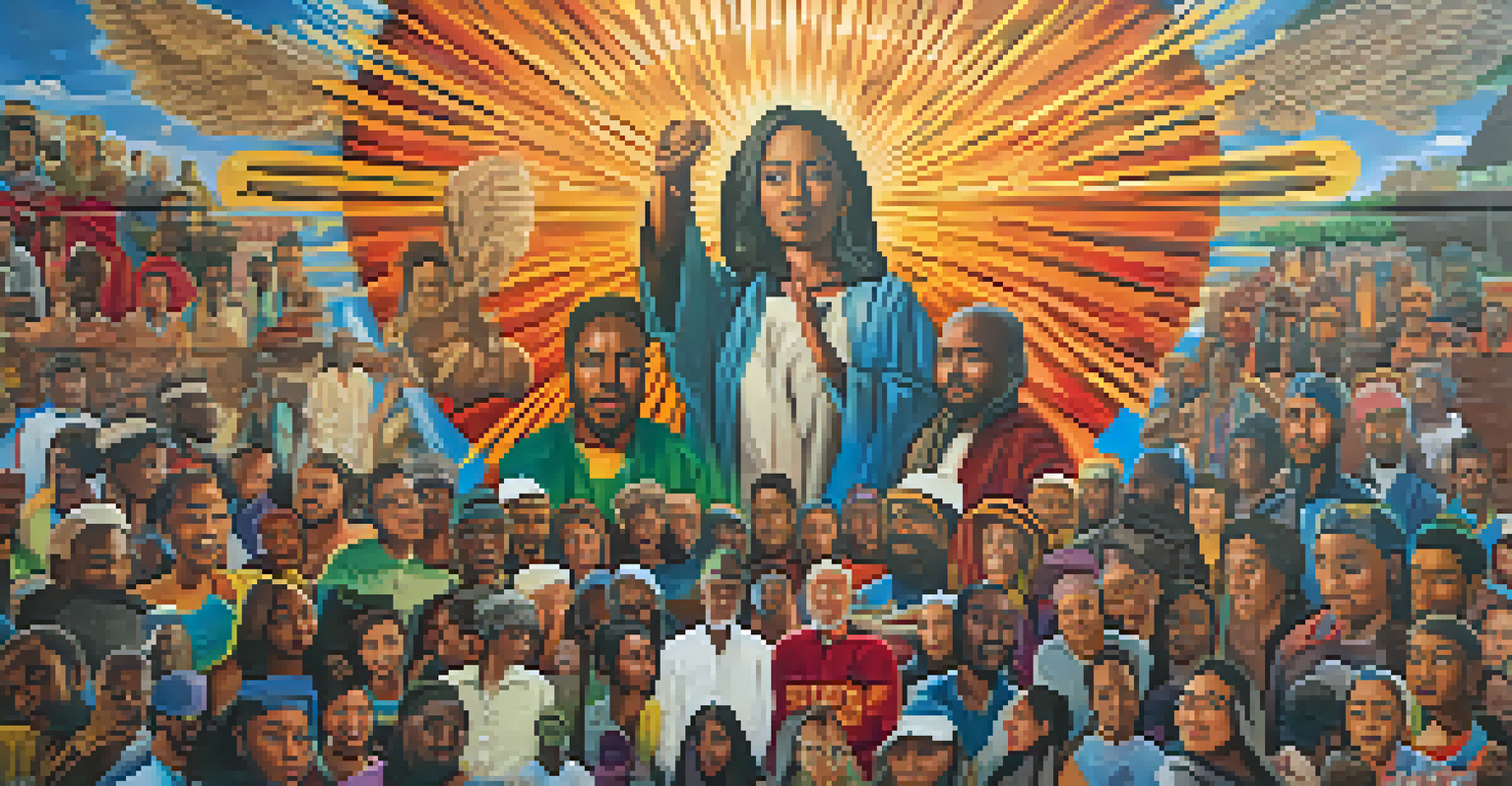Spiritual Activism: Bridging Faith and Economic Justice

Understanding Spiritual Activism in Today's Context
Spiritual activism is a growing movement that combines faith with social action. It encourages individuals to draw from their spiritual beliefs to fight for justice and equity. By merging these two realms, activists seek to inspire change rooted in compassion and community.
Faith is taking the first step even when you don't see the whole staircase.
Many people find that their spiritual beliefs compel them to address social issues, such as poverty and inequality. This connection can lead to powerful movements that challenge the status quo and advocate for marginalized communities. Ultimately, spiritual activism serves as a bridge between personal faith and collective action.
For example, numerous religious groups have taken a stand against systemic inequality, using their platforms to raise awareness and promote economic justice. By aligning their spiritual principles with social causes, they empower their communities to create meaningful change.
The Role of Faith in Promoting Economic Justice
Faith often provides a moral framework that guides individuals in their quest for justice. Many religious teachings emphasize the importance of caring for the poor and advocating for fair treatment. This sense of duty can inspire believers to engage in activism that promotes economic equity.

For instance, various faith-based organizations work tirelessly to address issues like food insecurity and access to education. These initiatives often stem from a deep-rooted belief that everyone deserves a fair chance at success. By harnessing the power of faith, activists can mobilize resources and support for those in need.
Spirituality Drives Social Action
Spiritual activism merges faith with social action, inspiring individuals to advocate for justice and equity.
Moreover, the spiritual perspective encourages a holistic view of justice, seeing it not just as a legal matter but as a moral imperative. This broader understanding can lead to innovative solutions that address the root causes of economic disparities.
Examples of Spiritual Activism in Action
Throughout history, we've seen countless examples of spiritual activism making an impact. Movements like Civil Rights in the United States were deeply rooted in faith traditions, with leaders like Martin Luther King Jr. using spiritual messages to rally support. These leaders understood that faith could be a powerful tool for social change.
The ultimate test of a moral society is the kind of world that it leaves to its children.
Today, initiatives like the Interfaith Movement for Human Integrity bring together diverse religious groups to advocate for policies that promote social justice. By uniting under a shared commitment to compassion and humanity, these groups amplify their voices and drive change.
In addition, grassroots organizations often leverage spiritual principles to address local economic issues. They provide not only resources but also a sense of community and belonging, which is vital for fostering resilience and empowerment among marginalized populations.
The Intersection of Spirituality and Economic Policy
As spiritual activists advocate for economic justice, they often engage with policymakers to influence change. This intersection between spirituality and economic policy can lead to more equitable systems that benefit everyone. Activists use their beliefs as a foundation for lobbying efforts and community organizing.
For example, faith leaders have played a critical role in pushing for policies that ensure living wages and fair labor practices. Their involvement signals to policymakers that these issues are not just political but moral as well. This can lead to more comprehensive and compassionate economic reforms.
Faith Fuels Economic Justice Efforts
Many faith-based organizations leverage spiritual beliefs to address economic disparities and promote fairness.
Additionally, by framing economic justice as a spiritual issue, activists can reach a broader audience. They invite individuals from various backgrounds to join the cause, fostering a more inclusive dialogue around economic policies.
Challenges Faced by Spiritual Activists
Despite the inspiring efforts of spiritual activists, they face several challenges on their journey. One significant hurdle is the perception of faith as separate from political or economic discussions. Many people struggle to reconcile their spiritual beliefs with the complex realities of economic justice.
Moreover, some activists encounter resistance from within their own communities, where traditional views may conflict with progressive ideas. This can lead to tension and division, making it difficult to unite efforts toward a common goal. Building consensus is crucial for effective activism.
Additionally, the urgency of economic issues can sometimes overshadow the spiritual elements of activism. Striking a balance between immediate action and long-term spiritual growth is essential for sustaining momentum in the movement.
Building Bridges Through Community Engagement
Community engagement is a vital aspect of spiritual activism, as it fosters connections and collaboration among individuals. By coming together, people can share their experiences and resources, creating a supportive network for addressing economic justice. This sense of community empowers individuals to take collective action.
Faith-based organizations often lead the way in community engagement, organizing events and initiatives that promote awareness and action. These gatherings can serve as a platform for dialogue and collaboration, encouraging participants to work together toward shared goals.
Community Engagement is Essential
Building connections through community engagement empowers collective action towards economic justice.
Furthermore, community engagement allows activists to tap into the strengths and talents of diverse individuals. By valuing each person's contributions, spiritual activism can create a more inclusive and effective movement for economic justice.
The Future of Spiritual Activism and Economic Justice
Looking ahead, the future of spiritual activism appears promising as more people recognize the need for economic justice. With growing awareness of social issues, individuals are increasingly motivated to align their spiritual beliefs with action. This shift signals a renewed commitment to advocating for change.
Emerging technologies and social media platforms are also playing a crucial role in amplifying the voices of spiritual activists. These tools allow for wider outreach and engagement, connecting like-minded individuals across geographical boundaries. The potential for collaboration is greater than ever.

Ultimately, spiritual activism has the power to inspire a new generation of advocates who see economic justice as a holistic mission. By fostering connections between faith and activism, we can work toward a more equitable world that reflects our shared values of compassion and justice.